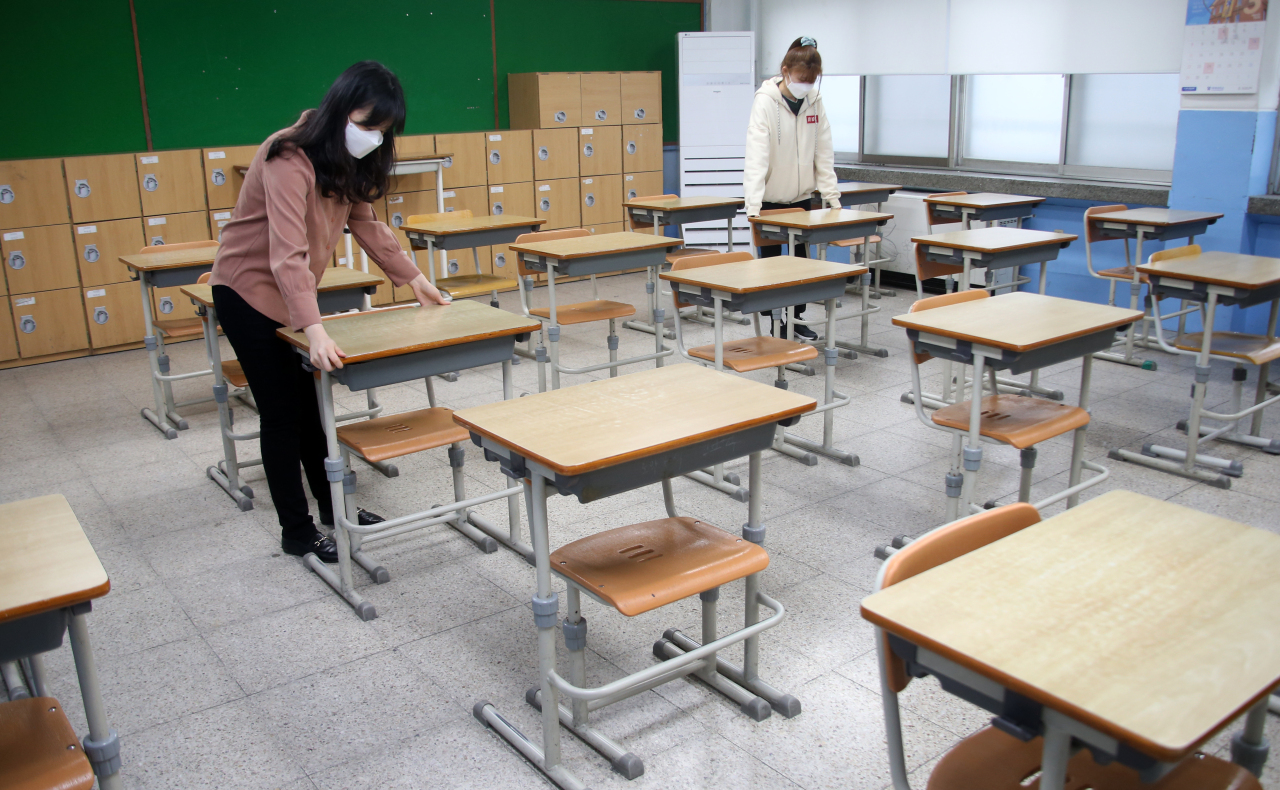[News Focus] Schools prepare for online classes as virus shows no sign of abating
By Lee Sun-youngPublished : March 29, 2020 - 19:53

Schools are likely to offer virtual classes, instead of opening on April 6 as scheduled, as the novel coronavirus continues to spread.
The Education Ministry said last week it was mulling online classes to help schools meet the statutory yearly school days as the spring semester, which normally begins in early March, has already been postponed three times due to COVID-19.
“We are considering both offline and online classes to prepare against possible community and classroom transmissions,” the ministry said in a statement Wednesday.
The government plans to announce on Monday or Tuesday whether to open schools on April 6.
A majority of the 17 metropolitan and provincial superintendents of schools are against having students physically attend schools in just a week.
During their meeting with Prime Minister Chung Sye-kyun on Saturday, most of the superintendents expressed great concern about starting offline classes when the government still maintains its highest infectious disease alert level, according to multiple government sources.
A recent survey showed that 73 percent of teachers believe schools should defer offline classes again to after April 6.
In a poll of 4,002 teachers, conducted Thursday and Friday by a teachers’ group called Good Teachers, 59 percent said schools should begin with online classes.
In the regions of Seoul-Gyeonggi Province and Daegu-North Gyeongsang Province, which saw high numbers of COVID-19 infections, 75 percent and 71 percent of the respondents, respectively, said the opening of schools should be further delayed.
In a recent survey of some 40,000 parents conducted by educational platform provider NHN Edu, 39.2 percent said they can send their children to school without worrying if no confirmed cases are reported for seven consecutive days.
As of Sunday, 619 of the confirmed cases in Korea were aged 19 or below, with 56 new cases added since March 23.
The country‘s total number of confirmed cases stood at 9,583, up 105 from a day earlier.
Even if schools do open, they would offer remote lessons should multiple infections occur in schools or community infections lead to school closures again, the ministry said.
In a set of guidelines for virtual classes announced Friday, the ministry categorized remote learning into three types: real-time interactive classes during which students and teachers can discuss or provide feedback via video conference platforms; content-based classes where students watch videos of lectures produced by EBS or their teachers, and teachers check what the pupils have learned; and assignment-based classes where students are given book reports or workbooks.
Whichever type the schools choose, the online lessons must meet the regular school hours of 40 minutes per class for elementary school, 45 minutes for middle school and 50 minutes for high school, the ministry said.
Schools can check attendance on a real-time basis through students’ participation online, text messages or phone calls, or after the classes by receiving study reports or parental confirmation.
Schools that have been selected as pilot operators of remote learning will run the classes online this week and report the problems they face to the central and local education authorities.
An enforcement decree of the Elementary and Secondary Education Act stipulates that heads of schools can remotely run classes using information and communication media.
Until last week, teachers put up materials online for students to download and study.
From this week, teachers will start uploading videos of lectures recorded in advance for students to view.
According to the ministry’s plan, schools will begin offering real-time online classes as per their timetable in three weeks.
Some elite high schools have already begun the real-time virtual lessons.
Many other schools, however, say they are not ready, as they lack proper recording equipment, webcams or Wi-Fi connection, and have no experience in online classes.
Some worry that young children in low-income families can be marginalized in remote learning as they will lack the parental guidance needed to focus on the virtual lessons.
Many students from low-income households do not have computers or smartphones.
A government survey last year showed that only 66.7 percent of low-income households had computers, compared to 83.2 percent in general.
The smartphone ownership rate was 84.9 percent among those in low-income households, compared to 91.4 percent in general.
The ministry said it will lend laptops and tablets, or provide support for internet and mobile data fees to those in need.
The ministry also signed on Wednesday an agreement for cooperation to support remote learning with 17 metropolitan and provincial education offices, educational broadcast network EBS and the Korea Education and Research Information Service.
By Kim So-hyun (sophie@heraldcorp.com)





![[K-pop’s dilemma] Can K-pop break free from ‘fandom’ model?](http://res.heraldm.com/phpwas/restmb_idxmake.php?idx=644&simg=/content/image/2024/05/09/20240509050541_0.jpg&u=20240509173751)




![[News Analysis] Yoon's first 2 years marked by intense confrontations, lack of leadership](http://res.heraldm.com/phpwas/restmb_idxmake.php?idx=644&simg=/content/image/2024/05/09/20240509050612_0.jpg&u=20240509233252)








![[Today’s K-pop] NCT’s Mark to drop 1st solo album in February 2025](http://res.heraldm.com/phpwas/restmb_idxmake.php?idx=642&simg=/content/image/2024/05/10/20240510050597_0.jpg&u=)